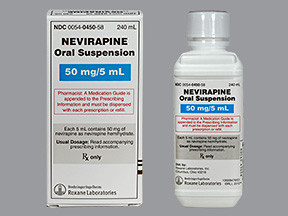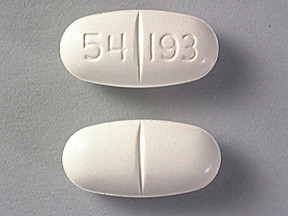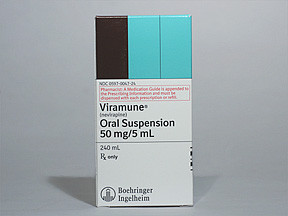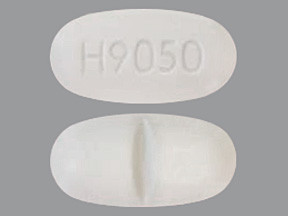NEVIRAPINE - ORAL
PHONETIC PRONUNCIATION: (ne-VIR-a-peen)
COMMON BRAND NAME(S): Viramune
GENERIC NAME(S): nevirapine
Uses
USES: This drug is used with other HIV medications to help control HIV infection. It helps to decrease the amount of HIV in your body so your immune system can work better. This lowers your chance of getting HIV complications (such as new infections, cancer) and improves your quality of life. Nevirapine belongs to a class of drugs known as non-nucleoside reverse transcriptase inhibitors (NNRTIs). Nevirapine is not a cure for HIV infection. To decrease your risk of spreading HIV disease to others, do all of the following: (1) continue to take all HIV medications exactly as prescribed by your doctor, (2) always use an effective barrier method (latex or polyurethane condoms/dental dams) during all sexual activity, and (3) do not share personal items (such as needles/syringes, toothbrushes, and razors) that may have contacted blood or other body fluids. Consult your doctor or pharmacist for more details. Nevirapine should not be used to prevent HIV infection after accidental exposure (such as needle sticks, blood/bodily fluid contact). Different HIV medications are used to prevent infection after exposure.
How to use NEVIRAPINE - ORAL
HOW TO USE: Read the Medication Guide and, if available, the Patient Information Leaflet provided by your pharmacist before you start using nevirapine and each time you get a refill. If you have any questions regarding the information, consult your doctor or pharmacist. Take this medication by mouth with or without food, usually once daily for the first 14 days when you start treatment, then twice daily or as directed by your doctor. If liver problems or skin/allergic reactions occur while you are taking this medication once daily, seek immediate medical attention and do not increase the dose to twice daily. If you are using the liquid suspension form of this medication, shake the bottle gently before each dose. Carefully measure the dose using a special measuring device/spoon. Do not use a household spoon because you may not get the correct dose. If you are using a dosing cup, rinse the cup with water after taking the medication and drink all of the rinse water to make sure you take the full dose. The dosage is based on your medical condition and response to treatment. In children, the dosage is also based on body size. Do not stay on the once-daily dosing schedule for more than 28 days. If you approach that period of time, your doctor should consider switching you to another medication. Consult your doctor for more details. If you stop taking this medication for more than 7 days for reasons other than the serious reactions described in the Warning section, ask your doctor for directions on how to restart treatment. You may need to take this medication once daily again for the first 14 days to decrease the risk of serious side effects. It is very important to continue taking this medication (and other HIV medications) exactly as prescribed by your doctor. Do not skip any doses. Do not increase your dose, take this drug more often than prescribed, or stop taking it (or other HIV medicines) even for a short time unless directed to do so by your doctor. Skipping or changing your dose without approval from your doctor may cause the amount of virus to increase, make the infection more difficult to treat (resistant), or worsen side effects. For the best effect, take this medication at evenly spaced times. To help you remember, take this medication at the same times every day.
Side Effects
Precautions
Interactions
Overdose
Images
Reviews
Faq for NEVIRAPINE - ORAL
Nevirapine is an antiretroviral medication used in the treatment of HIV infection. It belongs to the class of drugs known as non-nucleoside reverse transcriptase inhibitors (NNRTIs).
Nevirapine works by inhibiting the reverse transcriptase enzyme, which is essential for the replication of HIV. By blocking this enzyme, nevirapine helps to prevent the virus from multiplying and slowing down the progression of HIV infection.
Common side effects of nevirapine may include rash, nausea, vomiting, fatigue, headache, and liver problems. It is important to inform your healthcare provider if you experience any severe or persistent side effects.
Nevirapine is usually taken orally, either as a tablet or as an oral suspension. It is generally taken once daily, but the exact dosing regimen may vary depending on individual circumstances. It is important to follow your healthcare provider's instructions regarding the dosage and timing of nevirapine.
No, nevirapine is not a cure for HIV. It is an antiretroviral medication that helps to slow down the replication of the virus and control the progression of HIV infection. It is typically used in combination with other antiretroviral drugs as part of a comprehensive treatment regimen.
Yes, nevirapine can interact with other medications, including certain antifungal drugs, antibiotics, antidepressants, and herbal supplements. These interactions can affect the effectiveness of nevirapine or increase the risk of side effects. It is important to inform your healthcare provider about all the medications you are currently taking before starting nevirapine.
Nevirapine is considered safe to use during pregnancy, and it is often used as part of antiretroviral regimens for pregnant women with HIV. However, it is important to consult with your healthcare provider for personalized advice and monitoring during pregnancy.
The effectiveness of nevirapine can vary from person to person. It usually takes several weeks to months to see the full benefits of nevirapine treatment. It is important to continue taking the medication as prescribed, even if you start feeling better, to maintain viral suppression and prevent the development of drug resistance.
If you miss a dose of nevirapine, take it as soon as you remember. However, if it is close to the time for your next scheduled dose, skip the missed dose and continue with your regular dosing schedule. Do not take a double dose to make up for a missed one.
Warning
WARNING: Rarely, nevirapine has caused severe (sometimes fatal) liver problems. Seek immediate medical attention if you develop symptoms of liver problems such as persistent nausea, loss of appetite, vomiting, stomach/abdominal pain, dark urine, pale stools, yellowing eyes/skin, unusual tiredness, rash. Rarely, nevirapine has also caused serious (sometimes fatal) skin/allergic reactions. Get medical help right away if you have any signs of skin/allergic reactions, including rash, itching/swelling/redness (especially of the eyes/face), blisters, fever, persistent sore throat, unusual tiredness, mouth sores, severe dizziness, trouble breathing, signs of kidney problems (such as change in the amount of urine), muscle pain/tenderness/weakness, joint pain. Women are at increased risk for developing these severe reactions. To help decrease the risk of skin/allergic reactions in all patients, nevirapine is started at a lower dose for the first 14 days. Also, people with higher T-cell counts at the start of nevirapine treatment are at greater risk for liver problems. Therefore, nevirapine is usually only started if the T-cell count is fewer than 250 in women or fewer than 400 in men. Keep all medical and laboratory appointments so your doctor can monitor how you are responding to nevirapine. The risk of these serious side effects is high in the first 18 weeks and highest during the first 6 weeks of nevirapine treatment. However, these side effects may occur at any time while taking this medication. If you have stopped taking nevirapine because of liver problems or skin/allergic reactions, you must never take any form of nevirapine again. Tell all of your doctors and pharmacists if you have ever stopped taking nevirapine because of these types of reactions.
Disclaimer
IMPORTANT: HOW TO USE THIS INFORMATION: This is a summary and does NOT have all possible information about this product. This information does not assure that this product is safe, effective, or appropriate for you. This information is not individual medical advice and does not substitute for the advice of your health care professional. Always ask your health care professional for complete information about this product and your specific health needs.






No Reviews Yet